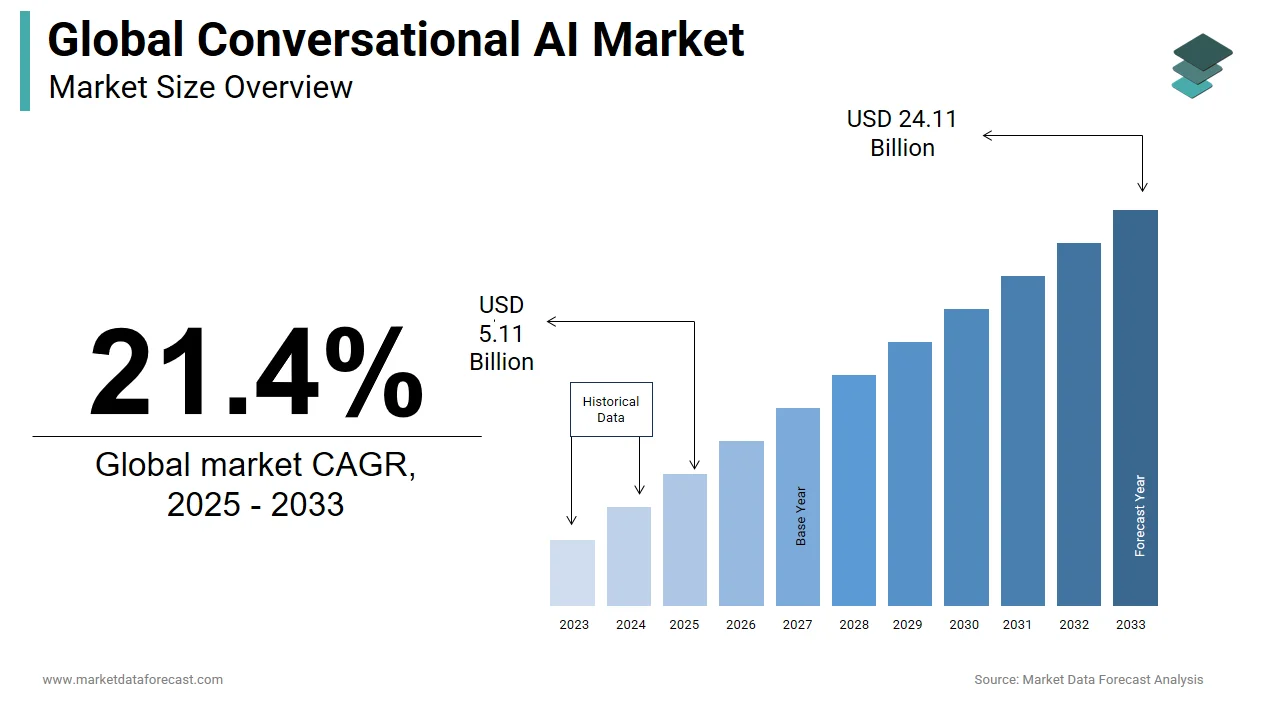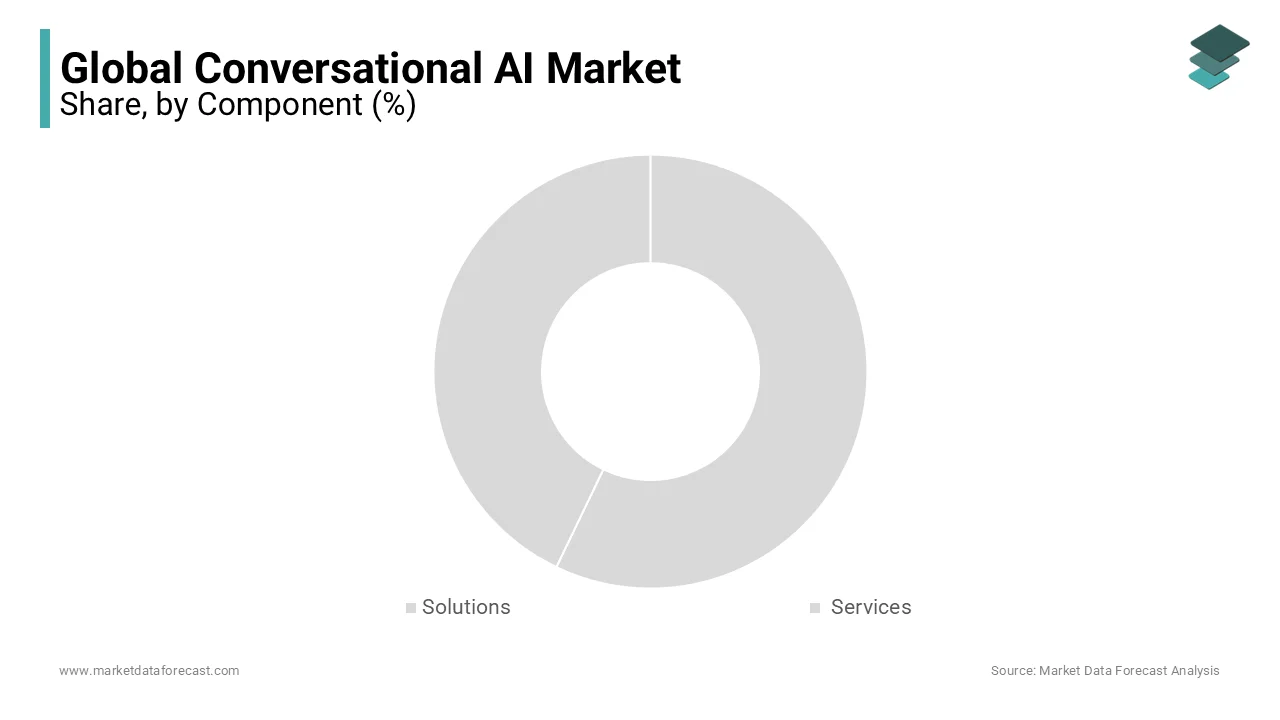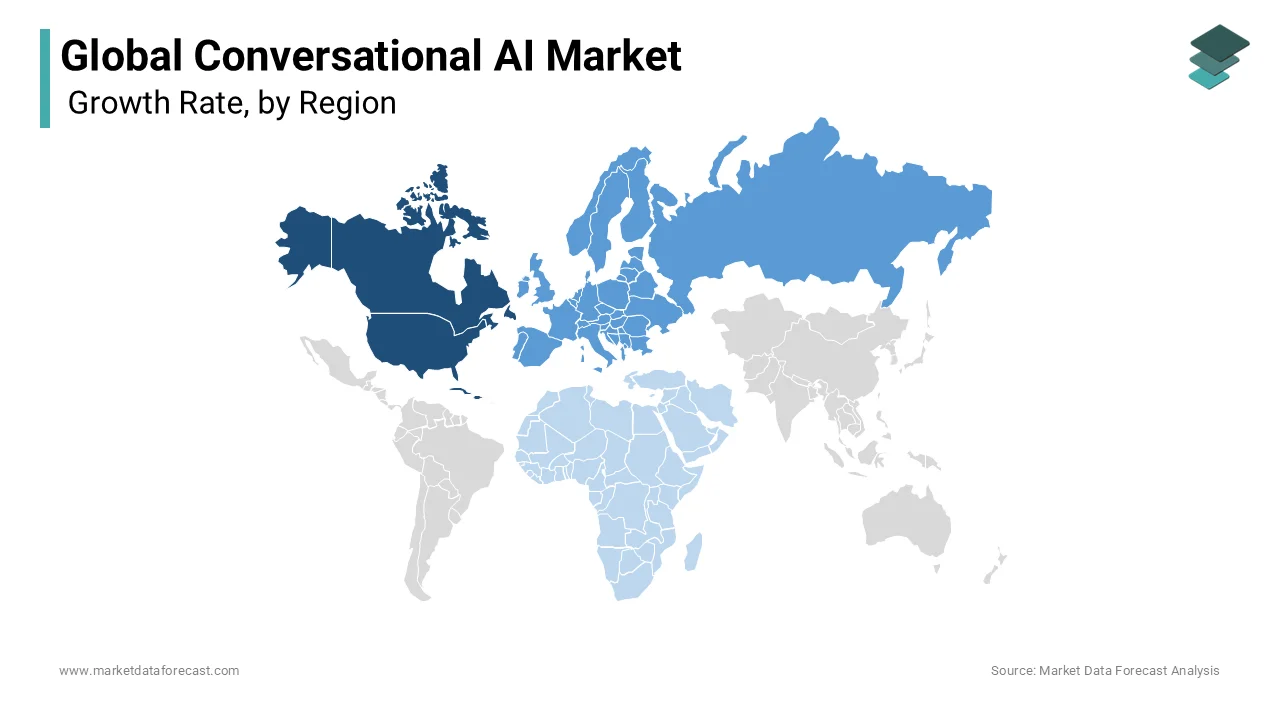Global Conversational AI Market Size, Share, Trends & Growth Forecast Report By Component (Solutions and Services), Type (Chatbots and Virtual Assistants), Technology (Natural Language Processing, Automated Speech Recognition and Machine Learning), End-Use (Healthcare, BFSI, Retail, Media & Entertainment, Travel & Hospitality and Others (Restaurants, Communications, and Utilities)), and Region (North America, Europe, Asia-Pacific, Latin America, Middle East and Africa), Industry Analysis From 2025 To 2033.
Global Conversational AI Market Size
The global conversational AI market was worth USD 4.21 billion in 2024. The global market is anticipated to be worth USD 24.11 billion by 2033 from USD 5.11 billion in 2025, growing at a CAGR of 21.4% from 2025 to 2033.

Conversational AI is a technology that empowers machines to engage in human-like conversations. Utilizing natural language processing and machine learning, these systems interpret and respond to user input, mimicking authentic dialogue. Found in chatbots, virtual assistants, and voice-activated interfaces, Conversational AI enhances human-machine interactions across customer support, business processes, and diverse applications. By understanding context, extracting meaning, and generating relevant responses it brings a natural flow to digital conversations, improving user experiences and providing efficient solutions in areas ranging from customer service to interactive technologies.
The conversational AI market is swiftly gaining traction, with voice features getting popular. Presently, voice assistants are spread throughout different aspects of daily lives, from smartphones to managing speakers and intelligent home devices, providing customised support and comfort.
- According to a study published in Acuvate, conversational AI is no longer regarded as only a novel idea, there is a rising adoption within the general population, with around 56.5 per cent of people stating it as ‘very’ or ‘somewhat useful’
Moreover, the integration of AI-based voice assistants has experienced tremendous growth, with prominent technology companies investing significantly in their advancement. Market trends show a major expansion in the world’s market size of voice assistants, highlighting their growing prominence and extensive adoption. In addition, AI chatbot is another trend rapidly spreading across the domains. Companies utilizing chatbots can lower traditional tasks and, at the same time, harmoniously manage different queries or demands from users. This fast means of managing customer requests, coupled with providing 24/7 assistance, supports businesses in enhancing customer loyalty.
MARKET DRIVERS
The rising demand for enhanced customer experiences has propelled market growth to embrace AI, revolutionizing customer interactions and satisfaction.
- As per a survey, about 70 per cent of customers anticipated AI solutions to understand and respond to their notions. Moreover, over 80 per cent of CEOs have opted to implement these tools for client management.
The rapidly gaining popularity of chatbots and virtual assistants is made in such a way as to deliver swift and efficient customer support. This technology enables businesses to engage with customers continuously by offering real-time assistance and personalized solutions. By leveraging conversational AI, companies streamline their customer service processes and cultivate higher levels of customer satisfaction. As a result, the instantaneous and tailored support provided by chatbots not only meets but often exceeds customer expectations, contributing to a positive brand perception.
Advancements in Natural Language Processing (NLP) and Machine Learning (ML) technologies have been an important opportunity that has significantly elevated the Conversational AI market's growth.
This ongoing progress has helped in a new era of sophisticated language understanding, providing these systems with a heightened level of awareness and improved conversational abilities. NLP advancements enable better interpretations of user queries, allowing AI systems to grab the complexity of language and context-dependent meanings. Moreover, ML algorithms, driven by large datasets and enhanced computational power, refine conversational AI's ability to learn and adapt over time, ensuring more accurate and contextually relevant responses.
MARKET RESTRAINTS
Initial costs and resource investments act as a significant restraint in the Conversational AI Market growth.
As implementing experienced conversational AI necessitates investments in cutting-edge technology, comprehensive training programs, and robust infrastructure for smaller businesses, these upfront expenses can be prohibitive, posing a downfall to the market. As a result, while conversational AI holds the potential to enhance customer interactions and operational efficiency, the financial burden associated with its implementation may impede the accessibility of these transformative technologies for smaller players in the business landscape.
Concerns regarding privacy and security act as a transformative challenge in the Conversational AI Market. Strong data protection measures are very crucial to prevent unauthorized access, reduce the risk of data breaches, and uphold the confidentiality of user details.
Furthermore, compliance with stringent privacy regulations is critical in establishing and preserving trust. As conversational AI continues to evolve, the ongoing commitment to stringent data privacy and security practices becomes a cornerstone for these technologies' sustainable growth and acceptance in various domains.
MARKET OPPORTUNITIES
Application in contact centers presents potential opportunities for the expansion of the conversational AI market. One of the major communicative AI trends and long-term forecasts is the integration into contact centers. These technologies are slated to transform their functions by automating daily tasks, improving executive performance, and enhancing user experience.
Additionally, training and educational tools are another potential prospect for this market. Conversational AI will be broadly utilised in learning and development experiences, mentoring, and education. Its capability to adjust to personal learning styles and speed can change educational approaches.
MARKET CHALLENGES
Understanding Natural Language is one of the primary challenges hindering the growth of the conversational AI market. Human language is exceptionally complicated and detailed. These AI systems, while intricate, are finding it difficult to interpret context, sarcasm, and slang. This can result in misunderstandings and errors in answers. For instance, a chatbot may not identify that a customer is conversing in a way that includes slang or sarcasm, leading to a misdirected response that may baffle or irritate the user.
Another hurdle for the market is sentiment analysis and emotion recognition. One of the issues that conversational AI systems encounter is precisely detecting emotions and sentiments in user interactions. As these systems commonly find it challenging to recognize emotional signals, they might reply inappropriately or struggle to adjust their communication style to align with the customer’s emotional state. This can cause irritation, misunderstanding, and a more forced dailogue.
REPORT COVERAGE
|
REPORT METRIC |
DETAILS |
|
Market Size Available |
2024 to 2033 |
|
Base Year |
2024 |
|
Forecast Period |
2025 to 2033 |
|
CAGR |
21.4% |
|
Segments Covered |
By Component, Technology, End-User, and Region |
|
Various Analyses Covered |
Global, Regional & Country Level Analysis, Segment-Level Analysis, DROC, PESTLE Analysis, Porter’s Five Forces Analysis, Competitive Landscape, Analyst Overview on Investment Opportunities |
|
Regions Covered |
North America, Europe, APAC, Latin America, Middle East & Africa |
|
Market Leaders Profiled |
Amazon Web Services, Inc., Artificial Solutions Holding ASH AB, Baidu, Inc., Conversica Inc., Haptik, IBM Corporation, Microsoft Corporation, Oracle Corporation, Google LLC, SAP ERP, and others. |
SEGMENTAL ANALYSIS
By Component Insights

During the forecast period, the services segment is predicted to grow at the fastest CAGR during the forecast period, while the solutions segment had the major share of the worldwide market in 202. This can be attributed to the escalating demand for AI-powered customer support. A substantial portion of users say customer experience is an important element in their buying decisions.
- Around 73 per cent of people are ready for AI-powered chatbots for customer service, and about 60 per cent have already utilised virtual assistants to enable purchases via voice commands
The solutions segment is slated to overtake the services category. The segment is quickly expanding due to the extensive application of chatbots, simple integration and rising demand for automated customer communication or engagement. Moreover, conversational AI resurged as an essential instrument for companies aiming to innovate techniques and approaches to enhance efficiency and save costs, which is elevating the segment’s market share.
By Type Insights
Based on type, the chatbot segment led the market in 2024 and is expected to continue its domination throughout the forecast period. Chatbots are known for their simplicity and cost-effectiveness and have been more widely adopted for routine and transactional interactions. They are prevalent in sectors like e-commerce and customer support where quick responses and task automation are crucial.
On the other hand, the virtual assistants segment has gained second prominence in industries where more sophisticated and personalized interactions are needed, such as healthcare, finance, and enterprise-level customer support.
By End-Use Insights
Based on end-use, the BFSI segment is anticipated to account for the largest share of the global market during the forecast period. Conversational AI has witnessed the largest significant adoption in the BFSI sector, particularly for customer service, personalized financial advice, and fraud detection. Chatbots and virtual assistants are employed to streamline banking operations, answer customer queries, and enhance the overall customer experience.
The retail and e-commerce industry has secondly embraced Conversational AI for customer support, product recommendations, and order tracking. Chatbots play a crucial role in engaging customers, providing real-time assistance, and facilitating seamless online shopping experiences.
- According to a study by Infosys, about 87 per cent of dealers, traders, and merchants have already implemented this technology in at least one aspect of their operations. 60 per cent of retail organisations are in the planning stage to enhance their AI investments in the coming years and by 2025, around 80 per cent of retail executives anticipate their companies to deploy AI.
REGIONAL ANALYSIS

North America has been a dominant force in the Conversational AI market. The region has witnessed extensive adoption across industries, including technology, finance, healthcare, and retail. The advanced technological infrastructure, a robust ecosystem of tech companies, and a strong focus on innovation contribute to North America's prominence in the Conversational AI landscape.
- According to research, in the United States, approximately 17 per cent of purchasers utilise chatbots to find data before buying a product. In addition, 40 per cent of US customers have started employing chatbots to connect with the retail industry.
Europe has also seen a second significant adoption of Conversational AI, with a focus on enhancing customer experiences and improving operational efficiency. European businesses prioritise AI solutions that align with data privacy regulations, emphasising the importance of GDPR compliance in Conversational AI implementations.
- As per a survey released in October 2023 in Computer Weekly, participants in the United Kingdom were observed to be taking the next step, with 94 per cent ranking voice chatbots as a top two priority for AI-powered abilities for consumer assistance and contact center operations, in contrast to 68 per cent in the United States.
The Asia-Pacific region has been experiencing rapid growth in the Conversational AI market. The diverse range of industries, large consumer bases, and a growing tech-savvy population contribute to the increasing adoption of AI-driven conversational solutions. The region's focus on digital transformation and the integration of technology into various sectors further propels the expansion of Conversational AI applications.
While Latin America has shown interest in Conversational AI, the adoption rate varies across countries. Brazil, for example, has seen increased use of chatbots in customer service and e-commerce. Economic factors, technology infrastructure, and awareness levels influence the adoption dynamics in the region.
The Middle East and Africa are gradually embracing Conversational AI, particularly in sectors like finance, healthcare, and telecommunications. The adoption pace varies across countries, influenced by economic conditions, technological readiness, and the specific needs of businesses in each region.
KEY MARKET PLAYERS
Companies playing a key role in the global conversational AI market include Amazon Web Services, Inc., Artificial Solutions Holding ASH AB, Baidu, Inc., Conversica Inc., Haptik, IBM Corporation, Microsoft Corporation, Oracle Corporation, Google LLC, SAP ERP, and others.
RECENT MARKET HAPPENINGS
- In October 2025, Microsoft reported the addition of voice and vision abilities to its Copilot, which is an AI assistant platform for Windows. This also includes a new presenter mode and more assistance for natural speech. AI voice functionality is the most impactful new feature of this update. At the core of Copilot, there are 4 curiously named voices, consisting of Canyon, Grove, Meadow, and Wave.
- In August 2025, Google announced that it is incorporating its AI chatbot Gemini with headphones and earbuds, allowing hands-free communication without a mobile with an intuitive and seamless experience.
MARKET SEGMENTATION
This research report on the global conversational AI market has been segmented and sub-segmented based on component, technology, end-user, and region.
By Component
- Solutions
- Services
By Type
- Chatbots
- Virtual Assistants
By Technology
- Natural Language Processing
- Automated Speech Recognition
- Machine Learning
By End-Use
- BFSI
- Healthcare
- Retail
- Travel & Hospitality
- Media & Entertainment
- Others (Restaurants, Communications, and Utilities)
By Region
- North America
- Europe
- Asia Pacific
- Latin America
- Middle East & Africa
Frequently Asked Questions
What are the main drivers of growth in the Conversational AI market?
The main drivers include the rising demand for AI-powered customer support services, advancements in natural language processing (NLP) and machine learning, the proliferation of messaging apps, and the need for efficient and personalized customer interaction solutions.
Which industries are the largest adopters of Conversational AI technology?
The largest adopters of Conversational AI technology are the retail, healthcare, finance, and telecom industries. These sectors leverage AI to enhance customer service, streamline operations, and provide personalized experiences.
What are the key challenges facing the Conversational AI market?
Key challenges include data privacy concerns, high implementation costs, lack of skilled professionals, and the complexity of developing sophisticated AI models that can understand and respond accurately to diverse user queries.
What are the future trends expected in the Conversational AI market?
Future trends include the integration of more advanced AI technologies such as emotional intelligence, improved multilingual support, deeper integration with IoT devices, and the expansion of AI applications in new sectors such as education and government services. Additionally, there will be a focus on enhancing the ethical use of AI and addressing data privacy issues.
Related Reports
Access the study in MULTIPLE FORMATS
Purchase options starting from $ 2500
Didn’t find what you’re looking for?
TALK TO OUR ANALYST TEAM
Need something within your budget?
NO WORRIES! WE GOT YOU COVERED!
Call us on: +1 888 702 9696 (U.S Toll Free)
Write to us: [email protected]